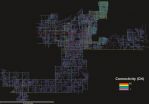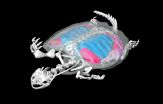(Press-News.org) LAWRENCE -- New study results from the University of Kansas to be presented this weekend at the Gerontological Society of America's annual meeting in Washington, D.C., bolster the adage that "heart healthy is brain healthy." The investigation shows neighborhoods that motivate walking can stave off cognitive decline in older adults.
"People can walk either to get somewhere or for leisure," said Amber Watts, assistant professor of clinical psychology, who will share her findings at a symposium Sunday, Nov. 9, in Liberty Salon K at the Washington Marriott Marquis.
"Depending on which type of walking you're interested in, a neighborhood might have different characteristics," she said. "Features of a neighborhood that encourage walking for transportation require having someplace worth walking to, like neighbors' houses, stores and parks."
Watts said neighborhoods that inspire walking for leisure also are full of pleasant things to look at, like walking trails or shade provided by trees. Also, such neighborhoods should make people feel secure on foot.
"For older adults, safety is a key issue in walkability," she said. "That includes things like traffic lights that give ample time to cross, sidewalks that are in good repair, and benches to stop and rest."
The researcher judged walkability using geographic information systems -- essentially maps that measure and analyze spatial data.
"GIS data can tell us about roads, sidewalks, elevation, terrain, distances between locations and a variety of other pieces of information," Watts said. "We then use a process called Space Syntax to measure these features, including the number of intersections, distances between places or connections between a person's home and other possible destinations they might walk to. We're also interested in how complicated a route is to get from one place to another. For example, is it a straight line from point A to point B, or does it require a lot of turns to get there?"
Watts said easy-to-walk communities resulted in better outcomes both for physical health -- such as lower body mass and blood pressure -- and cognition (such as better memory) in the 25 people with mild Alzheimer's disease and 39 older adults without cognitive impairment she tracked. She believes that older adults, health care professionals, caregivers, architects and urban planners could benefit from the findings.
The KU researcher and her colleagues used the space syntax data to estimate a "walkability score" for subjects' home addresses. Then they estimated the relationship between people's neighborhood scores and their performance on cognitive tests over two years, factoring in issues like age, gender, education and wealth, that might influence people's cognitive scores independently of neighborhood characteristics.
Interestingly, she found that intricate community layouts might help to keep cognition sharp, rather than serve as a source of confusion in older adults.
"There seems to be a component of a person's mental representation of the spatial environment, for example, the ability to picture the streets like a mental map," Watts said. "Complex environments may require more complex mental processes to navigate. Our findings suggest that people with neighborhoods that require more mental complexity actually experience less decline in their mental functioning over time."
Watts said that older adults, just like all people, tend to choose the easiest available route or the path of least resistance. "If there is an elevator immediately available, why would we choose the stairs?" she said.
"When the environment presents challenges that are reasonable and within a person's ability level, it keeps our bodies and minds healthy," Watts said. "We need that stimulation. With regard to the complexity of neighborhood street layouts -- for example, the number of turns required getting from point A to point B -- our results demonstrate that more complex neighborhoods are associated with preserved cognitive performance over time. We think this may be because mental challenges are good for us. They help keep us active and working at that optimal level instead of choosing the path of least resistance."
Watts said cognitive testing of the research subjects fell into three categories: attention, or mentally rearranging patterns of letters and numbers; verbal memory, or recalling words immediately and after a delay; and mental status, a screening test for symptoms of dementia.
The work builds on Watts' longstanding interest in health behaviors, prevention strategies and bio-behavioral processes associated with cognitive decline and dementia.
"I've always been interested in why people choose to engage in healthy behaviors or not," she said. "I had been very focused around issues of the individual until I met and started working with architects who study how the physical world around us influences our choices. I found that fascinating, and I wanted to incorporate that into my work about health behaviors."
INFORMATION:
The research was funded by $20,000 from the National Institute on Aging distributed through the KU Alzheimer's Disease Center and a KU Strategic Initiative Grant and Frontiers Clinical Translational Science award.
A detailed analysis by cybersecurity experts from the University of Maryland found that website administrators nationwide tasked with patching security holes exploited by the Heartbleed bug may not have done enough.
First disclosed in April 2014, Heartbleed presents a serious vulnerability to the popular OpenSSL (Secure Sockets Layer) software, allowing anyone on the Internet to read the memory of systems that are compromised by the malicious bug.
Assistant Research Scientist Dave Levin and Assistant Professor of Electrical and Computer Engineering Tudor Dumitras were ...
BOSTON (November 7, 2014) -- Researchers at Dana-Farber/Boston Children's Cancer and Blood Disorders Center have found a way to defeat one of the most tantalizing yet elusive target proteins in cancer cells - employing a strategy that turns the protein's own molecular machinations against it.
In a study published online by the journal Cell, the scientists used a specially crafted compound to disrupt the protein's ability to rev up its own production and that of other proteins involved in tumor cell growth. The result, in laboratory samples of neuroblastoma cancer cells ...
NASA's newest Earth observing mission, the International Space Station-Rapid Scatterometer, or ISS-RapidScat provided a look at the winds within post-tropical cyclone Nuri on Nov. 5 and 6 as it moved parallel to Japan. Nuri has moved across the Pacific and is expected to bring hurricane-force wind gusts to Alaska's Aleutian Islands today, Nov. 7.
"RapidScat passed over Nuri, near Japan, three times within a 24 hour period," said Doug Tyler of NASA's Jet Propulsion Laboratory, Pasadena, California. "The progression [in three images] showed Nuri's path."
RapidScat measured ...
New York - As Americans face growing health and financial burdens from preventable, non-communicable diseases such as cardiovascular disease, diabetes and certain cancers, a new study demonstrates employers have a unique opportunity to improve Americans' health. The research is led by Dr. Katherine Tryon and Dr. Derek Yach from the Vitality Institute and is published in the November issue of the Journal of Occupational and Environmental Medicine.
The study, which involved a first-of-its-kind comprehensive review of existing research into workplace health programs, notes ...
In a new study published in the scientific journal Oncotarget researchers from Uppsala University show that a therapeutic vaccine directed against tumor vessels can reduce tumor burden and suppress formation of spontaneous lung metastases in a mouse model for metastatic breast cancer.
The target molecule of the immunization strategy is the extra domain-A (ED-A) of fibronectin, a protein domain which is highly selective for the tumor vasculature in the adult.
"The vaccination approach we have employed is not prophylactic but therapeutic, meaning that immunity was induced ...
Tropical Cyclone 05B was meandering in the Bay of Bengal on Nov. 8, but forecasters expect it to move west and head toward east-central India for landfall. NASA-NOAA's Suomi NPP satellite captured a visible image of the tropical storm off India's coast.
When Suomi NPP flew over Tropical Cyclone 05B (TC05B) on Nov. 7 at 08:09 UTC (3:09 a.m. EST), the Visible Infrared Imaging Radiometer Suite or VIIRS instrument aboard captured a visible image of the storm. The VIIRS image showed a band of thunderstorms wrapping into the center from the northern quadrant, and fragmented ...
Amyotrophic lateral sclerosis (ALS) is a very severe disease that mainly affects the motor system. Recently the focus of public attention thanks to a viral campaign (remember last summer's ALS Ice Bucket Challenge?), ALS leads to progressive paralysis and ultimately death. Among the lesser known symptoms of the disease are cognitive impairments, which may even involve full-blown dementia. One of them is a selective difficulty in understanding and using verbs denoting actions, which these patients find much more challenging to process compared to nouns denoting objects. ...
This news release is available in German.
How can a sequence of dance steps best be learned? This question was the subject of a project led by researchers from Bielefeld University and the Palucca University of Dance in Dresden, who developed the study along with dancers and dance instructors. Together they researched whether dancers learn a dance sequence better by seeing or by listening, that is, if a dance instructor first demonstrates the sequence, or if he or she first gives a spoken explanation. The research article detailing the results of this study was recently ...
Through the careful study of modern and early fossil tortoise, researchers now have a better understanding of how tortoises breathe and the evolutionary processes that helped shape their unique breathing apparatus and tortoise shell. The findings published in a paper, titled: Origin of the unique ventilatory apparatus of turtles, in the scientific journal, Nature Communications, on Friday, 7 November 2014, help determine when and how the unique breathing apparatus of tortoises evolved.
Lead author Dr Tyler Lyson of Wits University's Evolutionary Studies Institute, the ...
Being shown pictures of others being loved and cared for reduces the brain's response to threat, new research from the University of Exeter has found.
The study discovered that when individuals are briefly presented pictures of others receiving emotional support and affection, the brain's threat monitor, the amygdala, subsequently does not respond to images showing threatening facial expressions or words. This occurred even if the person was not paying attention to the content of the first pictures.
Forty-two healthy individuals participated in the study, in which ...






